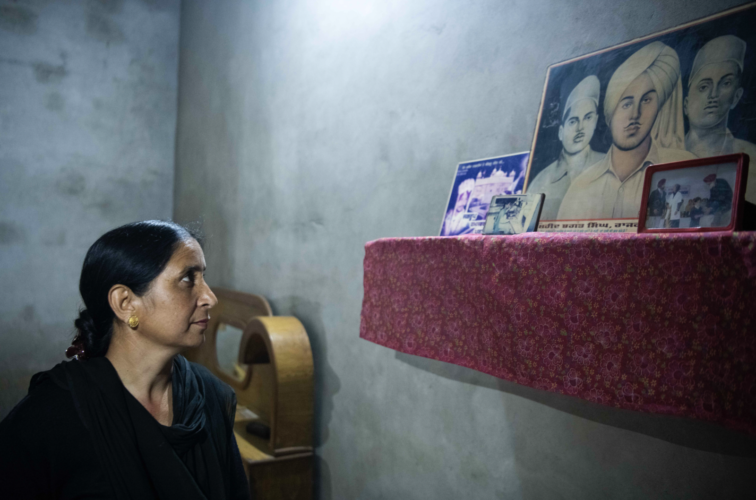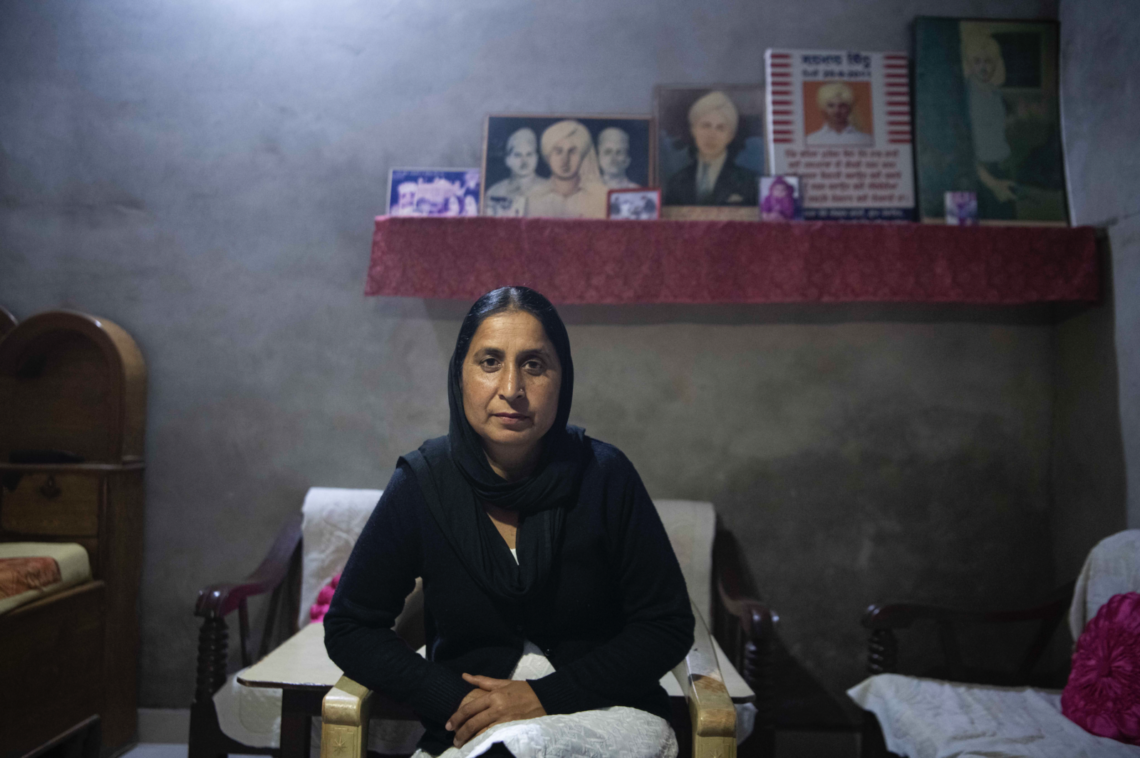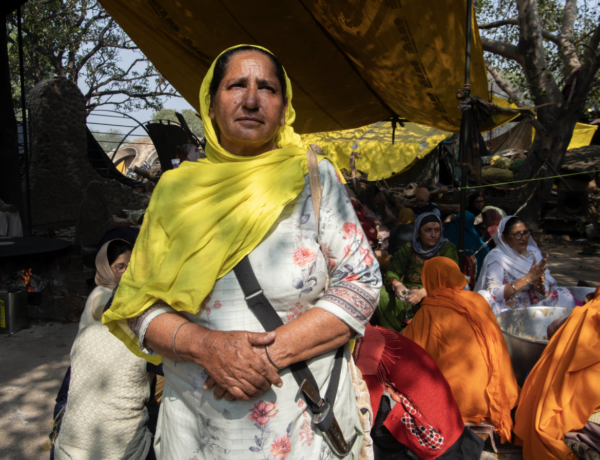By Rohit Lohia
Photographer and journalist Rohit Lohia sits down with Paramjeet Kaur in Punjab to talk about her life of protesting and her conviction to stand up for the rights of women and laborers in her village.
Paramjeet Kaur is a 44 year old labourer, activist, village feminist icon, and first woman vice-head of the Lehra Azad Labour Union. For the past six months, along with her husband, Jagroop Singh and her 15 year old son, she has been attending farmers protests near to her home at toll plazas, petrol pumps, and railroad blockades.
She has been motivating her fellow labourers to join the protests in large numbers. “Farmers are the most essential part of our family here,” she said. “We, as labourers, get employment from them, and we get vegetables, animal fodder, wheat, and rice – sometimes when we can’t even afford to pay. Oftentimes, when someone dies in our families, farmers donate rations and supplies, and stand beside us.”
In addition to her solidarity and dependence on farmers, Paramjeet is compelled to protest as she fears the new farm bills will facilitate the privatisation of lands, as has been done with the thermal plant where she works. She also believes that this plant will soon be shut down and cause mass unemployment since the bills will cause basic commodities, such as electricity, to skyrocket in price, making operation unprofitable.
A Legacy of Protesting
Protesting has a impacted and shaped Paramjeet’s considerably. In fact, her current occupation as a contract worker at the state-owned Guru Hargobind Thermal Plant in Lehra Mohabbat, Bathinda, Punjab and her role as a union leader was inspired by witnessing protest in 2011.
Prior to her job at the thermal plant, Paramjeet worked elsewhere (in Ludhiana), when she came across a protest in Bathinda. She saw people sitting on roads and chanting, which piqued her curiosity. Paramjeet started talking to the protestors and listening to their problems which made her concerned about government wrongdoings. She was appalled when she heard how people were forced to accept poor working conditions for minimum wages because of unemployment fears.
“It actually made me feel sad and helpless,” she said “The workers here are on yearly contracts and not on permanent payrolls which strip them of many benefits.” She added that often, companies will illegally keep half of a worker’s wages knowing that workers have no recourse.
Soon after this experience, Paramjeet left her job in Ludhiana and got a job at the power plant and joined the labour union. She recalls, “I had empathy and dedication to work for people protesting for their livelihood and rights. The poor people were discriminated against and oppressed, and women were the worst victims.”
In addition to factory exploitation, she explained how laborers, as a class, are also discriminated against by other community members. “Labourers are not allowed to step inside someone’s house with shoes on, they are not allowed to enter farmlands, and women are not allowed to step out of their houses. It was worse in 2011. I started going to more protests, started meeting women at their homes, and hosting meetings to make people aware of their rights.”
Jailed for Resisting
While workers may be grateful for Paramjeet’s activism, the powers-that-be are not as enthusiastic. Paramjeet was given a cold reminder of the strength of her opposition in 2013 when her work landed her in jail.
Five contract workers had just been fired from the power plant without proper explanation, she said. “It was during a harsh summer in the month of June. We protested [against their wrongful dismissal] for 5 days where women and even children joined us. Thermal plant officials destroyed our water cans and on the 5th day they called the police. We were beaten with batons. Many people left the protest site but me, my husband, along with 70 men, and 3 women stayed behind and resisted the police.”
Paramjeet’s resistance resulted in being arrested and jailed. She was detained for five days along with other the workers who had continued to protest. During their time in jail, they organised a hunger strike to demand reinstating the fired thermal plant workers. Paramjeet says they were threatened in jail, told they would be held indefinitely, and would “rot with rats and stink”.
Paramjeet proudly recalls the episode with a shine in her eyes, “Keep us for two months or four months! We will keep protesting for what is right.”
Lack of Village and Family Support
After being released, problems for Paramjeet continued. Her family and villagers accused her of bringing them shame; her brother refused to let her into her own house and villagers started abusing her, calling her a disgrace for spending time in jail. “Villagers used to incite my brother,” she said. “They claimed ‘Our women don’t even step out of houses. She is a disgrace and should be locked in a house like other women in the village.’ ”
“My brother, who came to take care of my child, didn’t behave any better. I was blamed for fighting for my rights. I was blamed for leaving my 8 year old child alone, as both me and my husband were in jail.”
Paramjeet said that she believes part of this lack of support comes from men fearing a shift in gender power dynamics. She thinks that men fear that if a woman steps out of the house and gets civically active, she will have the courage to challenge their wrong-doings at home.
The negative reaction of villagers and her family, the stigmatisation of women attending protests, and the taboo of seeing women outside of their homes motivated Paramjeet to action. “I started meeting women at their houses, organised meetings to tell them how important it is for women to step out and fight for what they deserve.”
Sikh Inspiration
During our conversation I noticed Paramjeet’s room was filled with Bhagat Singh photos and books, prompting me to ask about her sources of inspiration. She smiled and said, “My husband and I draw our inspiration and strength from Bhagat Singh. My husband would give me reading material and we used to watch documentary movies on Bhagat Singh.” She finds herself fascinated by the idea of how he stood against British injustices at such a young age. She adds, “I used to think ‘If I am to be allowed, I want to fight for rights and bring equity.’ Now working for that is one of my biggest wishes granted by God.”

Paramjeet said she also draws strength from her Sikhi. In addition to Maharani Chand Kaur and Gulab Kaur as her role models she looks to the Gurus. “The way Guru Gobind Singh Ji stood against wrongs where he sacrificed his children but refused to bend; the way every other Guru fought against wrong; the way [Guru Tegh Bahadur Sahib] sacrificed their head at Chandani Chowk; the way they sacrificed their families – that is what keeps me going.”
“I say the same when I’m on the mic at protests – that we have to draw strength from our Gurus whenever we feel hopeless or demotivated. We will never ever bow down as Sikhs, even if we die. We need to fight a lot.”
“Governments have tried to suppress Punjab with drugs, jails, and force,” she said. “Modi also thought similarly – that the youth of Punjab are preoccupied with drugs and people are too uneducated to understand the laws. But he forgot one thing, Punjab is a land of sacrifices – for the nation’s sovereignty or for themselves. We are not weak, fools, or uneducated.”
Delhi Farmers Protests
Currently, Paramjeet and her husband, whom she sees as her biggest supporter, are mobilising and motivating more labourers to join the farmer protests at the Delhi borders. She believes, “We shall fight and we shall win for sure. Because losing is not an option as our children’s future is at stake.”
I asked Paramjeet about the role of women at the current farmers protests. She said, “We say men and women are equal in everything. So why aren’t we equal when it comes to putting up a fight or standing against evil? It is women who manage expenses at home, so their voices matter a lot.”
She finds confidence in being a woman herself and adds, “In today’s times when employment is less and expenses are more, a woman must step out and get employed for herself and for her child’s future – to give her child a future where they get education and don’t have to labour.”
As I was leaving, Paramjeet introduced me to her son. She smiles and jokes, “I have told him, ‘Someday your mother and father might not come home again and you might hear they have been jailed. Do not fear if that happens, just stay with neighbours.’ ”





No Comments